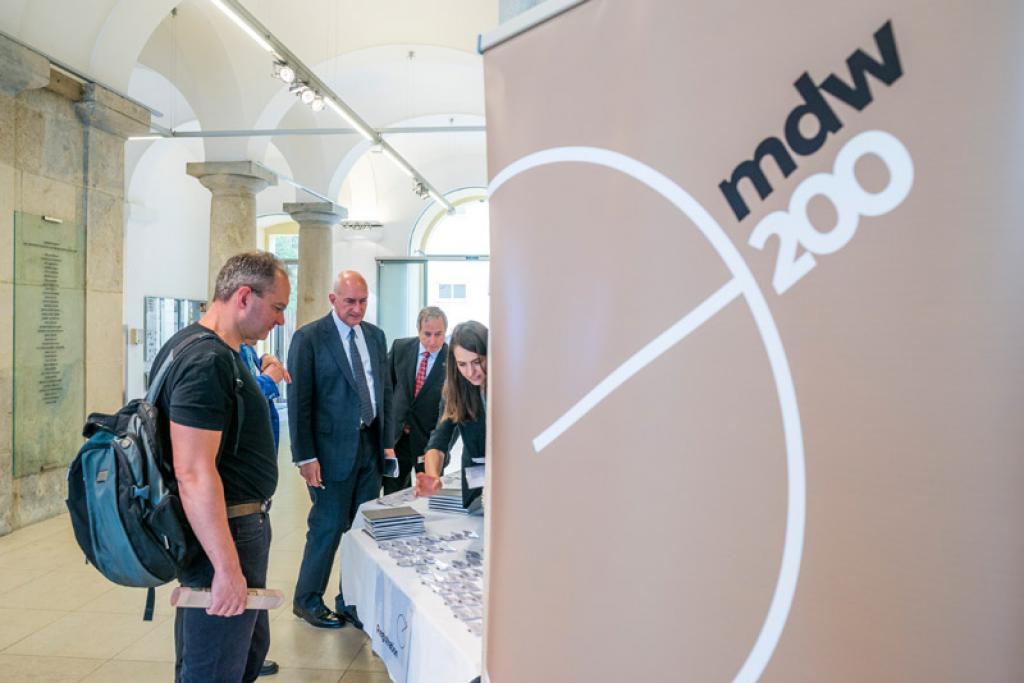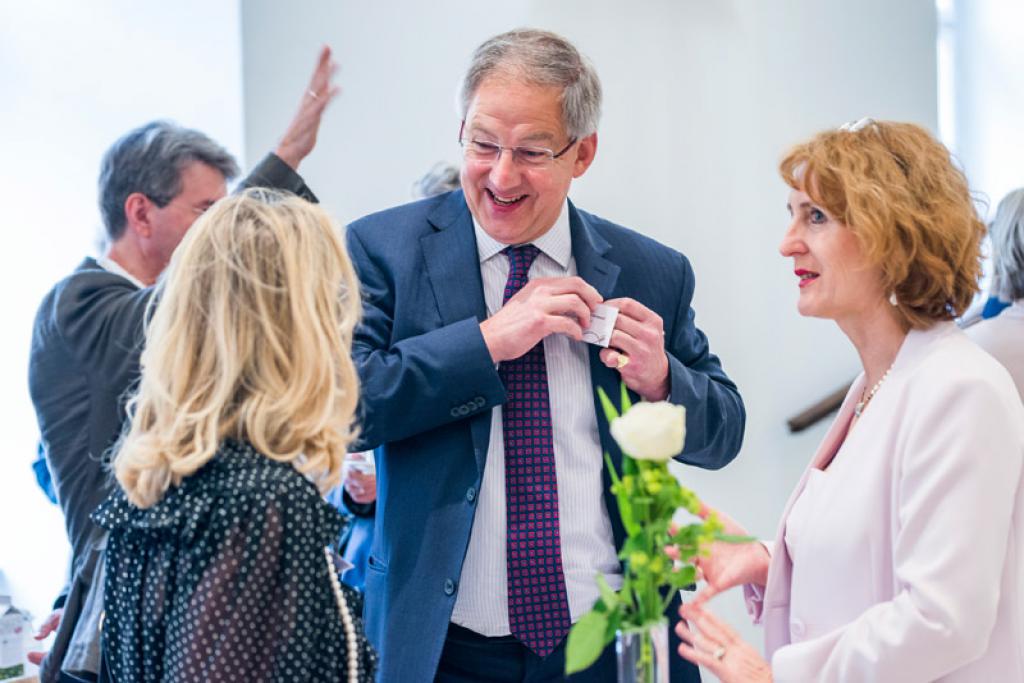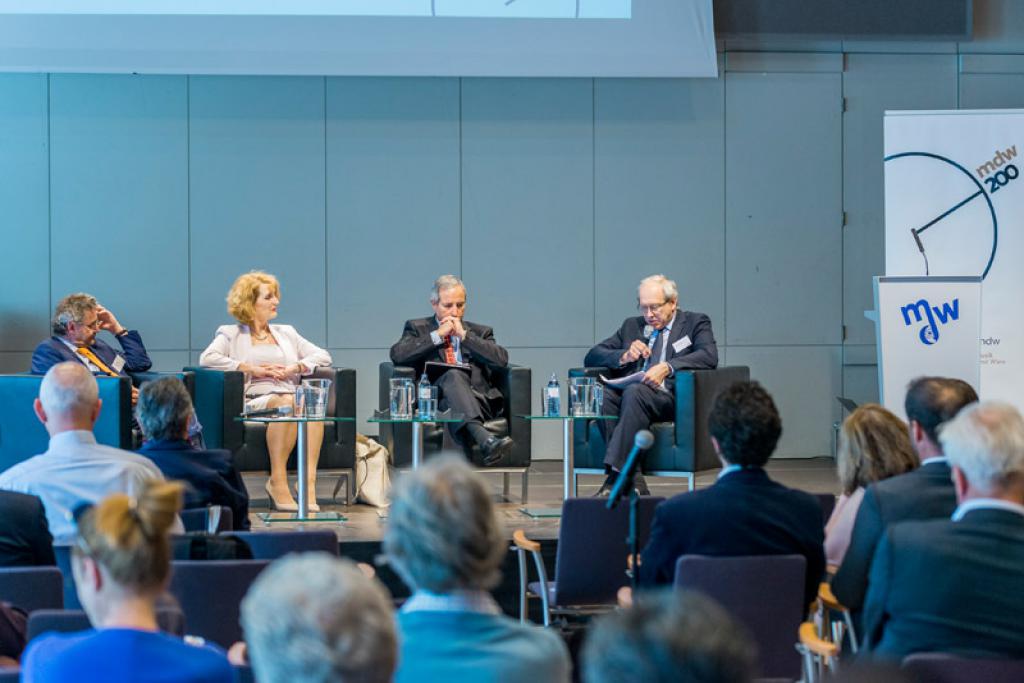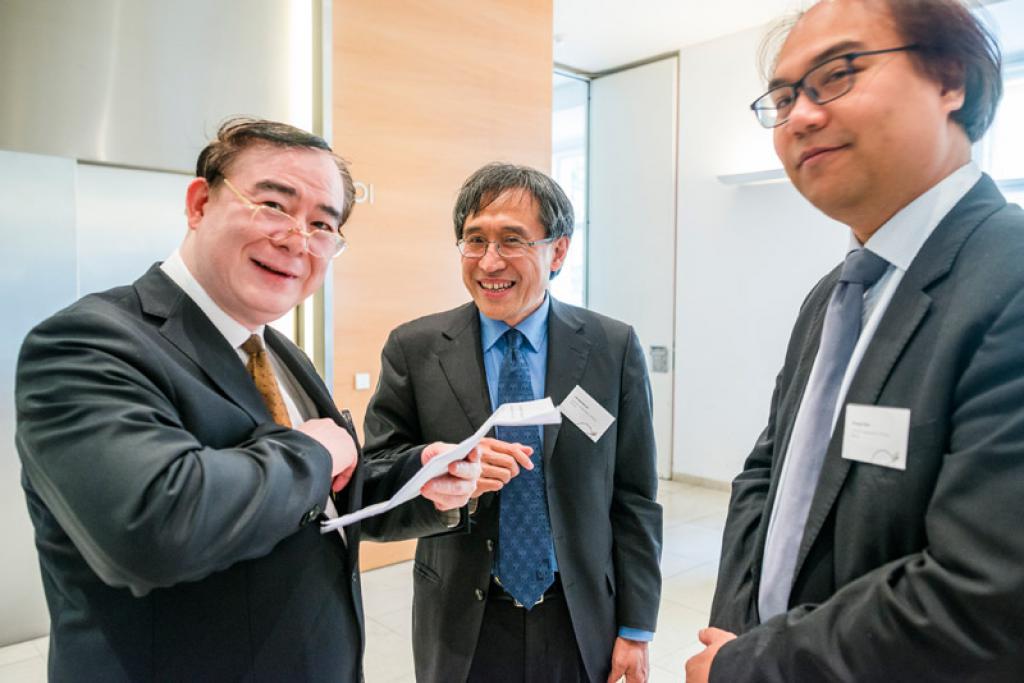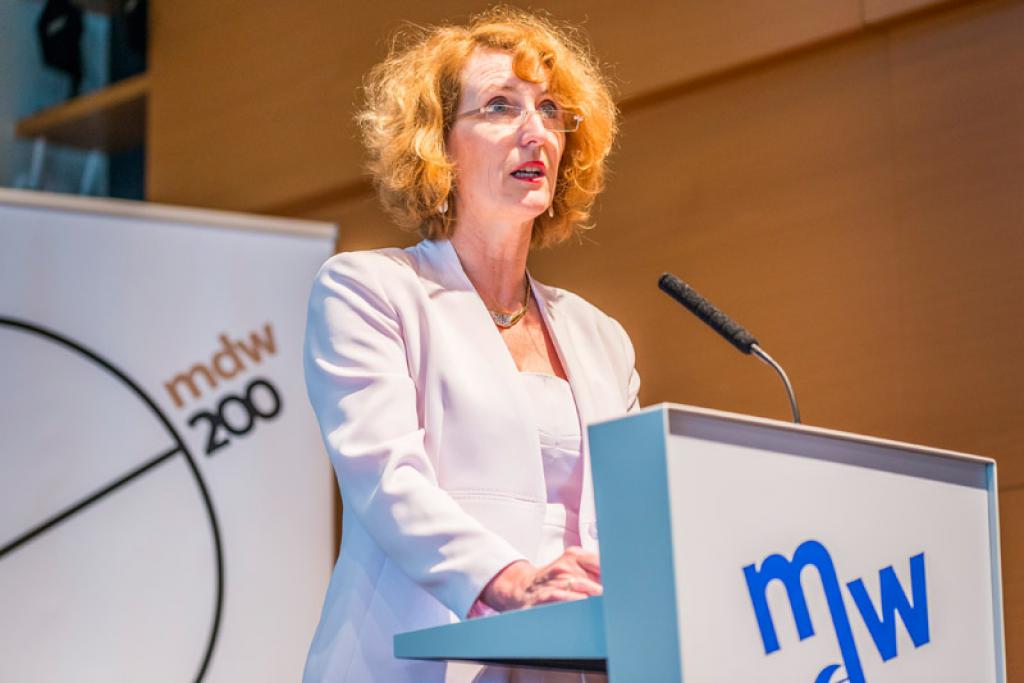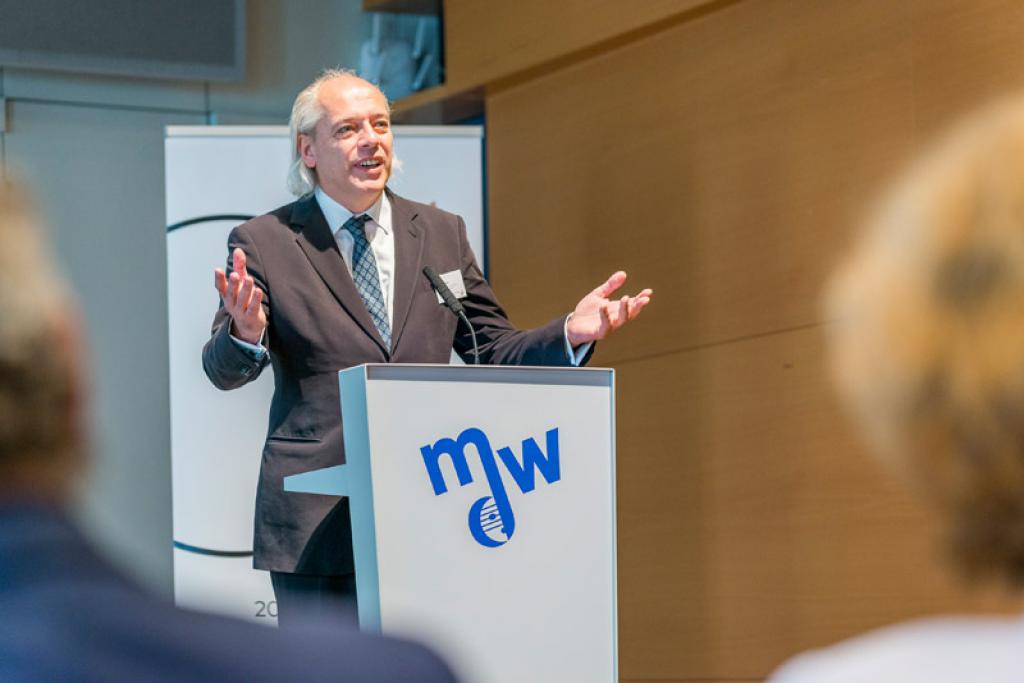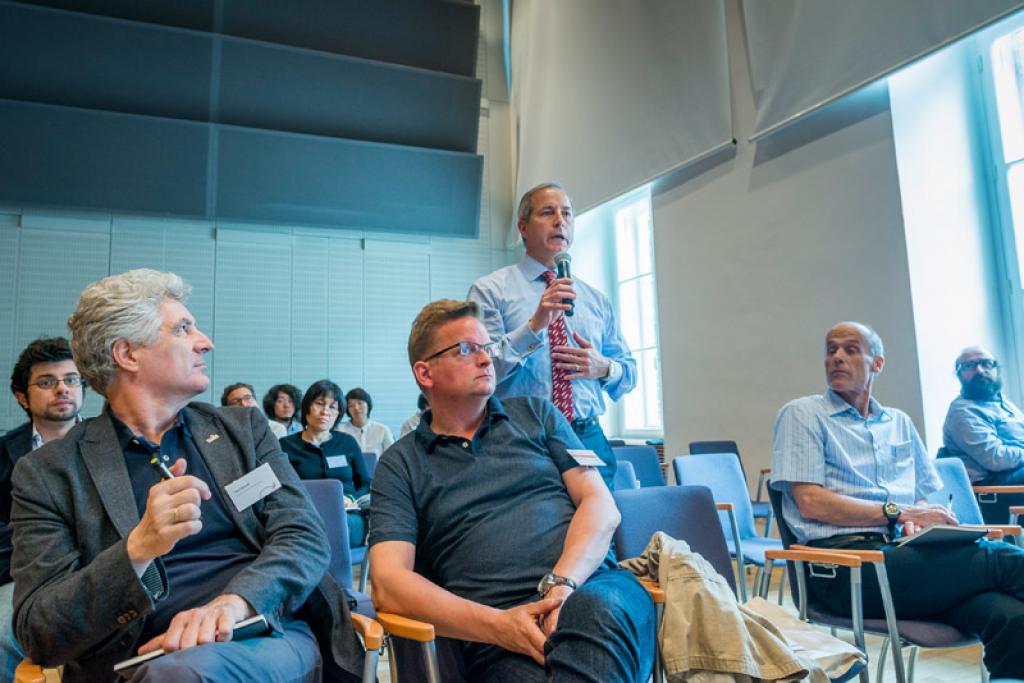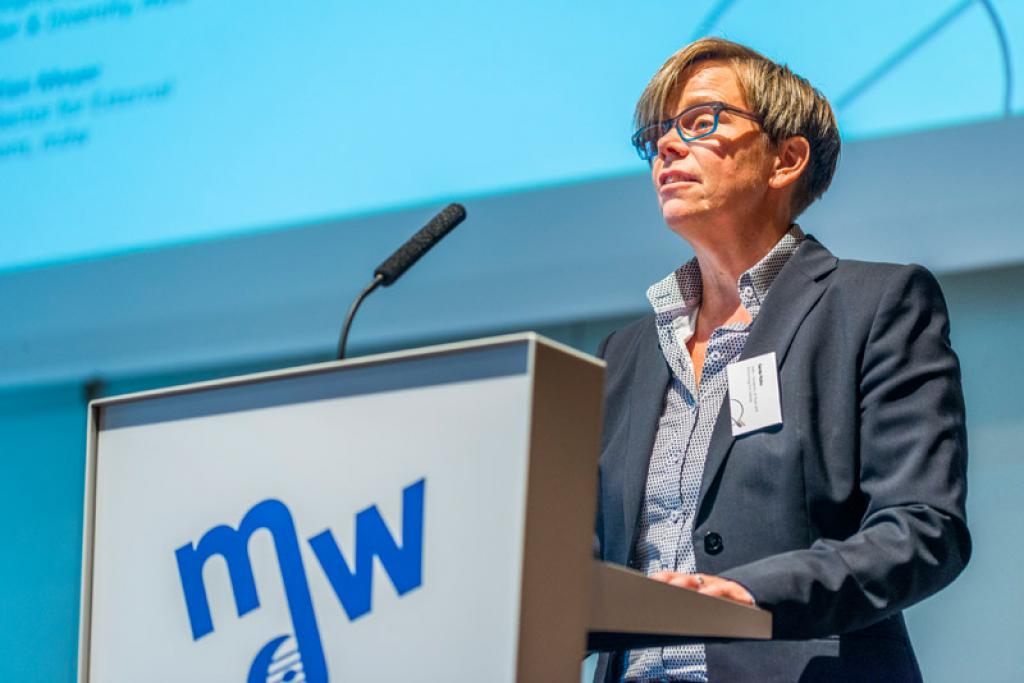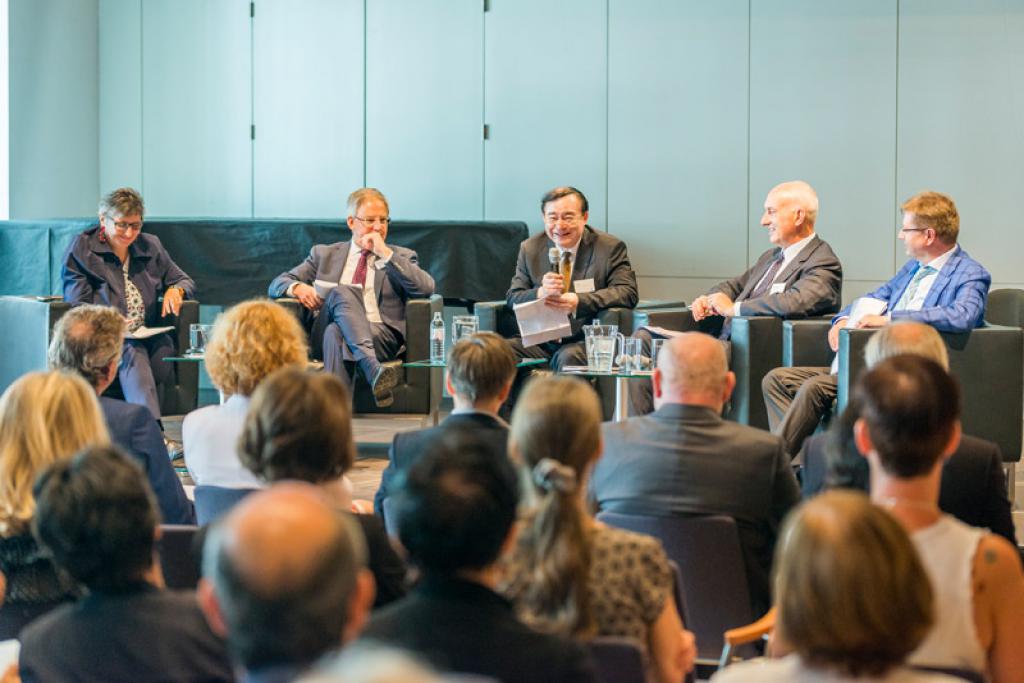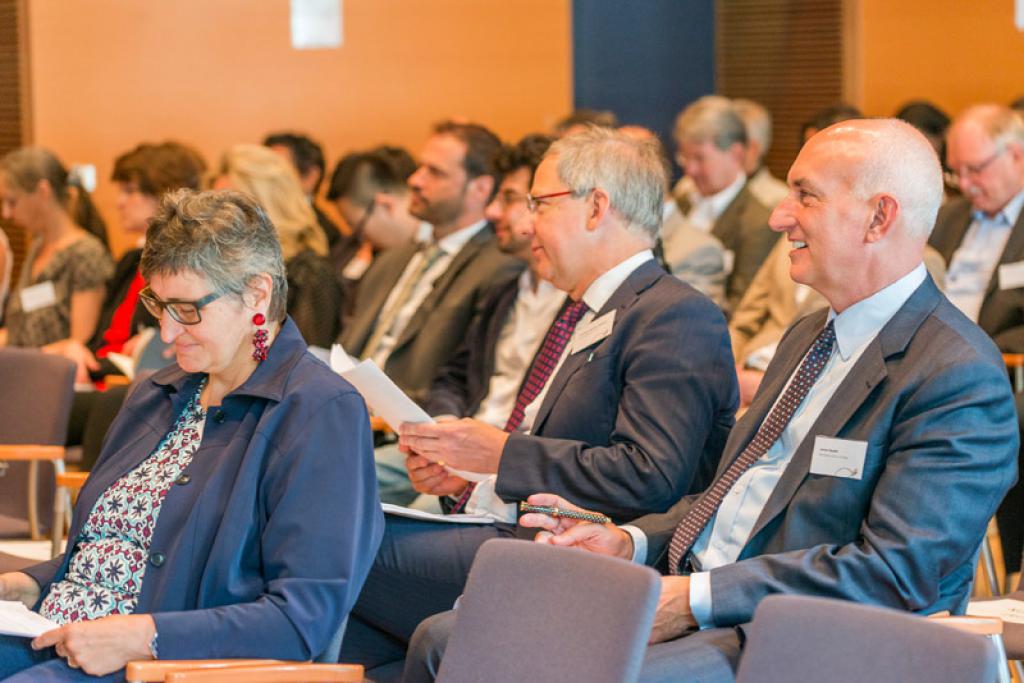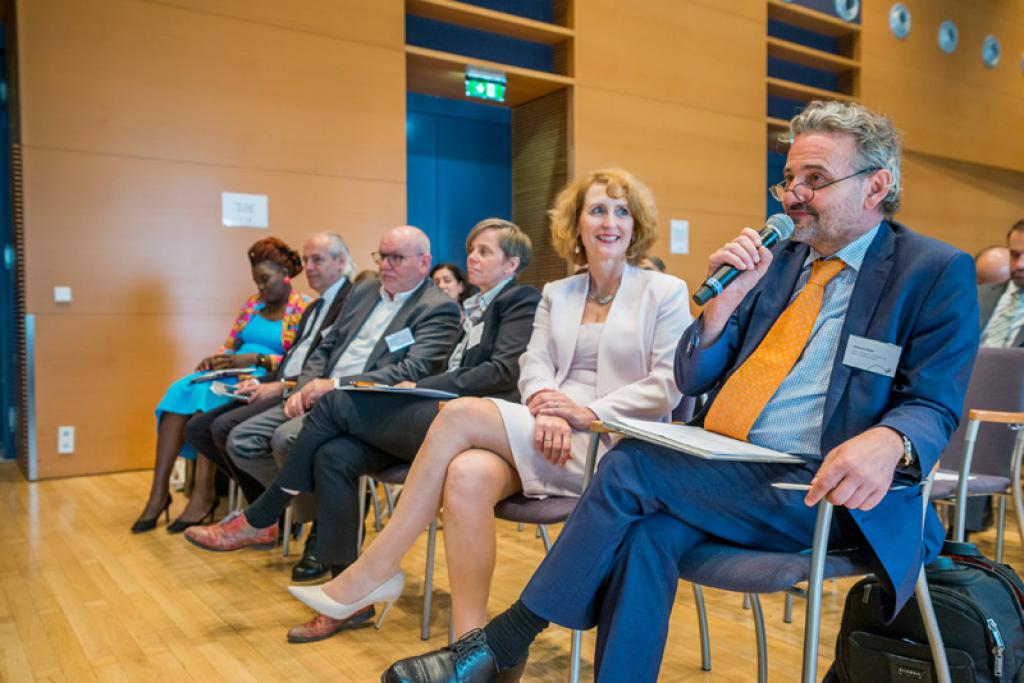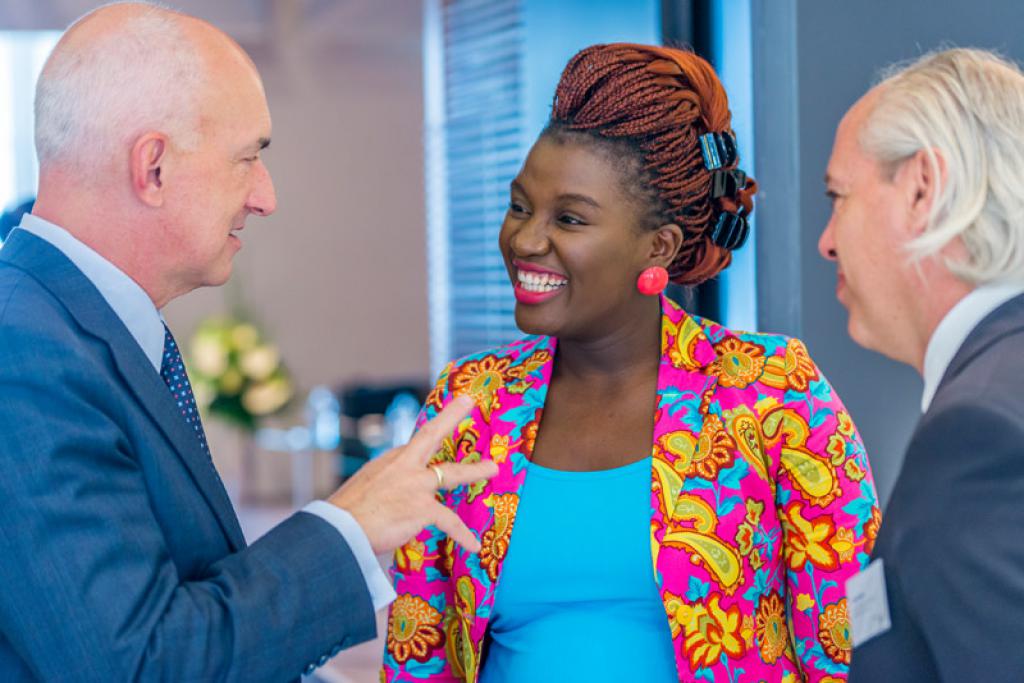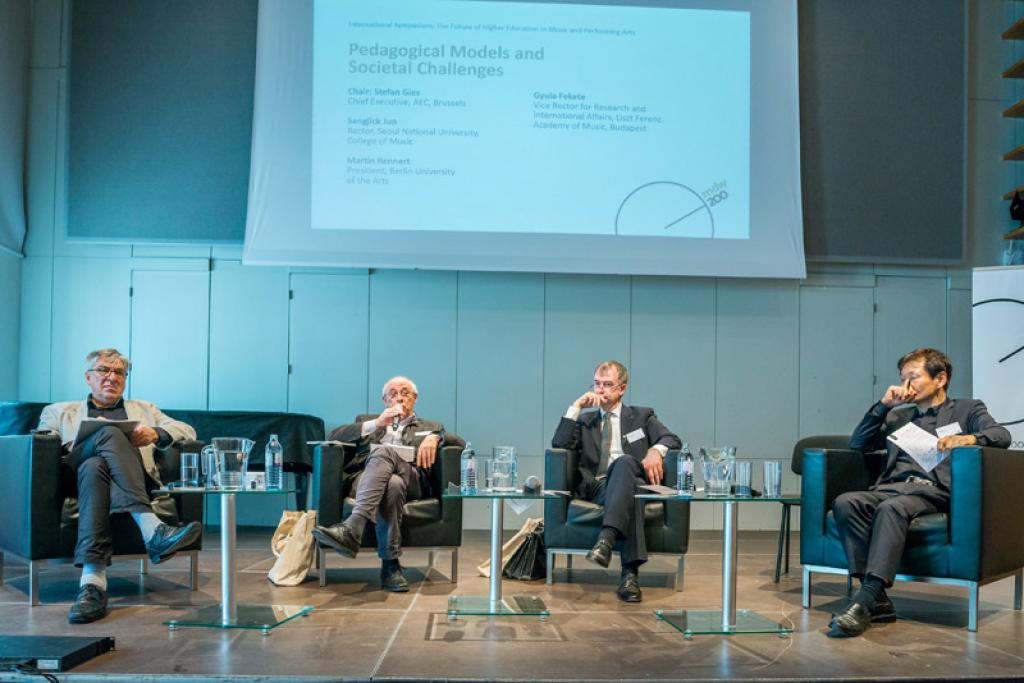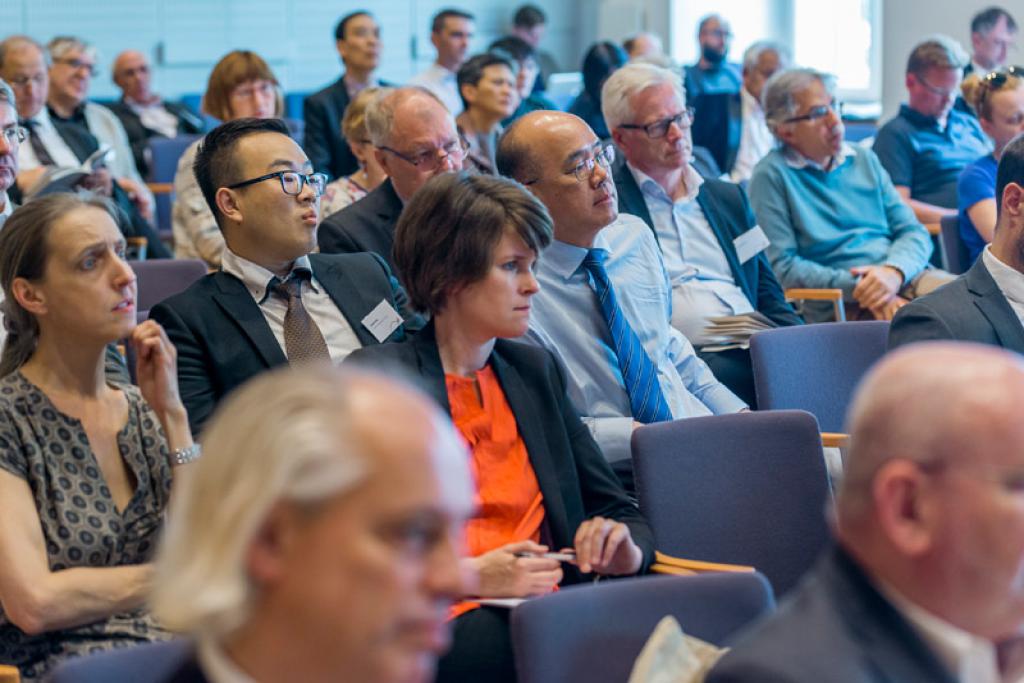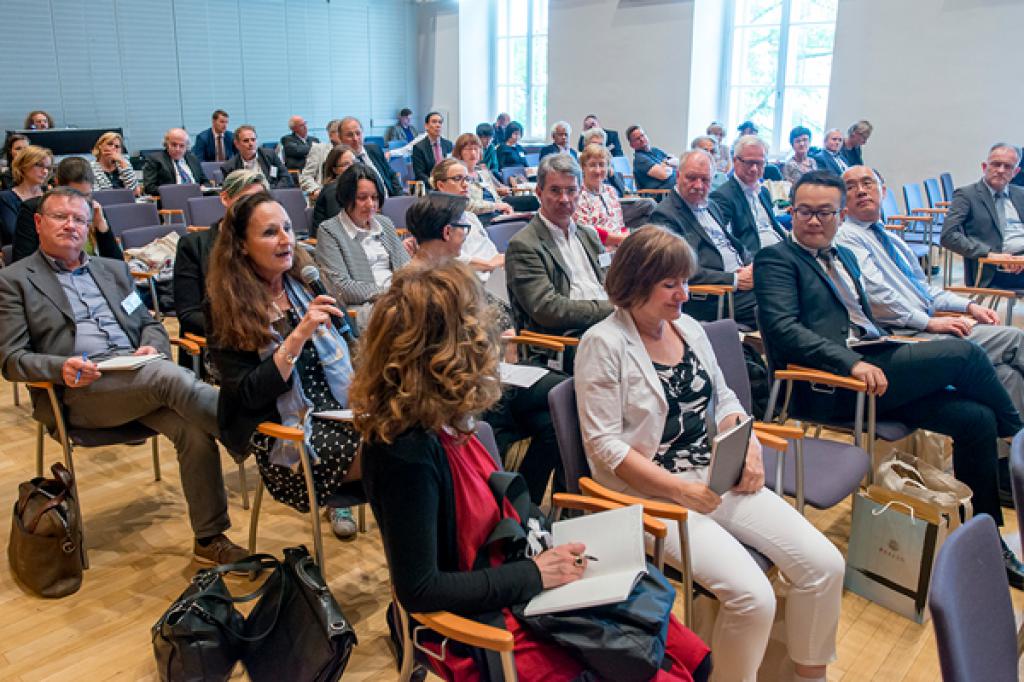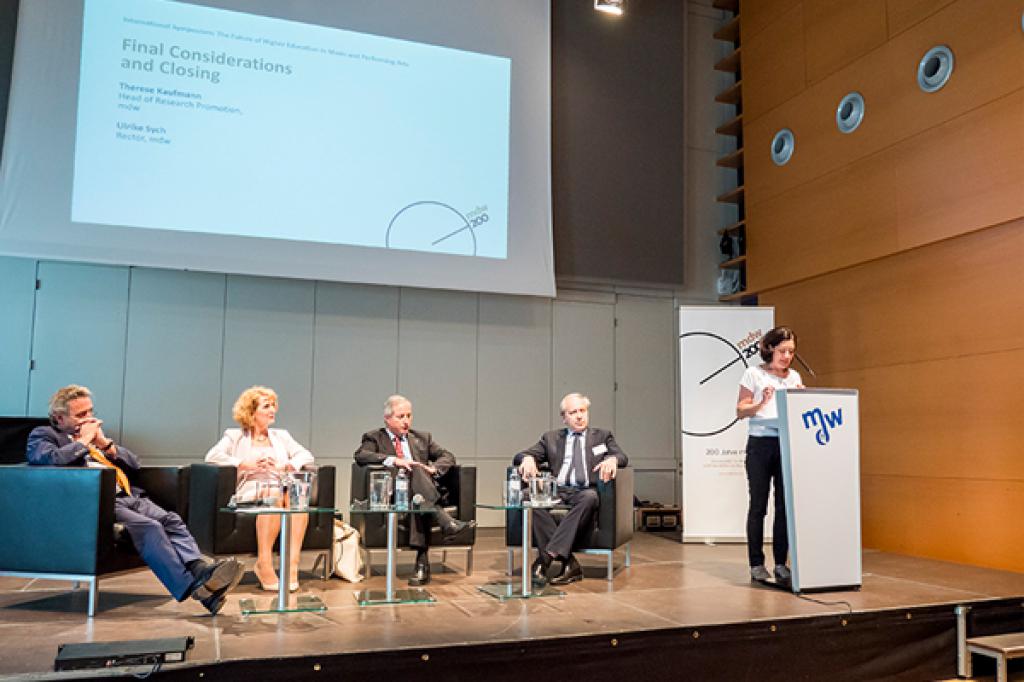International Symposium: The Future of Higher Education in Music and Performing Arts
Institutional Perspectives – Global Challenges – Innovative Approaches
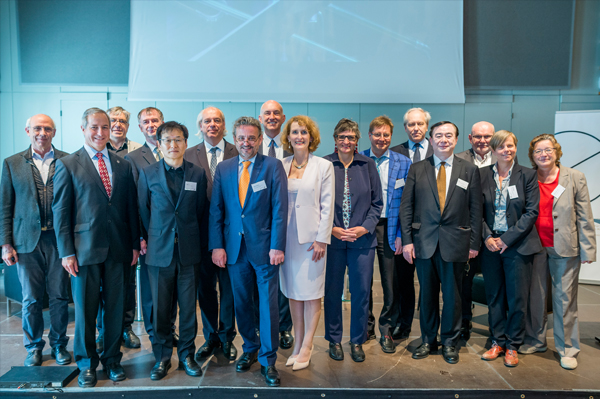 Foto: ©Marcell Nimführ
Foto: ©Marcell Nimführ
From left to right:
- Martin Rennert (President of the Berlin University of the Arts)
- Jamal Rossi (Dean of the Eastman School of Music)
- Stefan Gies (Professor of Music Education at the University of Music, Dresden)
- Gyula Fekete (Vice Rector for Research and International Affairs, Liszt Ferenc Academy of Music, Budapest)
- Sangjick Jun (Rector of the Seoul National University, College of Music, Seoul)
- Christian Meyer (Vice Rector of External Relations, mdw)
- Johannes Meissl (Head of Senate, mdw)
- James Gandre (President of Manhattan School of Music, New York)
- Ulrike Sych (Rector, mdw)
- Barbara Boisits (Vice Rector for Research at the University of Music and Performing Arts Graz)
- Jari Perkiömäki (Rector, University of the Arts Helsinki)
- Konstantin Zenkin (Vice Rector of the Moscow State Tchaikovsky Conservatory)
- Yu Feng (President of Central Conservatory of Music, Beijing)
- Johann Bergmann (Vice Rector of Financial Affairs and Business Administration, mdw)
- Gerda Müller (Vice Rector of Organizational Development, Gender & Diversity, mdw)
- Barbara Gisler-Haase (Vice Rector for Academic Affairs, Art and Young Artists' Promotion, mdw)
On 7 June 2017 an international symposium on the future of higher education in music and performing arts took take place at the mdw.
Update: Impressions of the symposium
About the Symposium
Today, providers of tertiary education in the areas of music and performing arts face a myriad of new challenges. Within a complex matrix of concerns ranging from artistic excellence to pedagogical missions and responsibilities towards society, a number of questions arise:
How does an institution's self-conception change in light of an increasingly competitive global education market?
How does arts education respond to the increasing significance of creative and knowledge economies and the massive transformations occurring in the prospective occupational fields of their future graduates, as well as to the changes taking place in our societies due to global migration?
What measures can training institutions in the fields of music and performing arts develop in light of our era's cultural, political, social, and economic changes?
What strategies need to be developed in order to act in a flexible, future-oriented, and socially balanced manner?
And what does the artistic training of the future look like?
Programme, Biographies & Conclusions
Click item to enlarge or download the programme folder (pdf, 290 kb)
Conclusions (pdf, 162 kb)
Programme
- 9.00 am: Welcome
- 9.30 am: Opening
- Ulrike Sych, Rector, mdw
- Gerda Müller, Vice Rector for Organizational Development, Gender & Diversity, mdw
- Christian Meyer, Vice Rector for External Relations, mdw
- Mercy Otieno, Department of Drama, Max Reinhardt Seminar, mdw
- 9.50 am: Positioning within the Global Context
Chair: Barbara Boisits, Vice Rector for Research, University of Music and Performing Arts Graz
Speakers:- Yu Feng, President, Central Conservatory of Music, Beijing
- Jonathan Freeman-Attwood, Principal, Royal Academy of Music, London
- James Gandre, President, Manhattan School of Music, New York
- Jari Perkiömäki, Rector, University of the Arts Helsinki
- 10.30 am: Discussion
- 11.00 am: Break
- 11.30 am: Pedagogical Models and Societal Challenges
Chair: Stefan Gies, Chief Executive, Association Européenne des Conservatoires, Académies de Musique et Musikhochschulen (AEC), Brussels
Speakers:- Gyula Fekete, Vice Rector for Research and Internal Affairs, Liszt Ferenc Academy of Music, Budapest
- Sangjick Jun, Rector, Seoul National University, College of Music
- Martin Rennert, President, Berlin University of the Arts
- 12.10 pm: Discussion
- 12.40 pm: Break
- 1.30 pm: Careers and Fields of Work for Musicians/Artists
Chair: Johannes Meissl, President, mdw Senate
Speakers:- Jamal Rossi, Dean, Eastman School of Music, Rochester
- Konstantin Zenkin, Deputy Rector for Scientific Affairs, Moscow Tchaikovsky Conservatory
- Ulrike Sych, Rector, mdw
- 2.10 pm: Discussion
- 2.40 pm: Final Considerations
Conclusions: Therese Kaufmann, Head of Research Promotion, mdw
- 3.00 pm: Closing
Biographies
Yu Feng
President of and professor and doctoral supervisor at the Central Conservatory of Music. In addition to having been president, artistic director, and principal conductor of the China Central Opera Theatre and artistic director of the Shenzhen Symphony Orchestra, he has also served as chairman of the China Conducting Society and vice chairman of the China Artistic Education Promotion Association.
Studies in conducting at the Central Conservatory of Music and at the Hanns Eisler Academy of Music in Berlin; MA degree in Beijing and doctoral-level artist diploma of conducting in Berlin.
Yu receives invitations to collaborate with many famous symphony orchestras both at home and abroad such as the Deutsches Symphonie-Orchester Berlin, the Berlin Orchestra, the International Symphony Orchestra of Germany, Napoli Orchestra in Italy, the Gulbenkian Orchestra in Portugal, and the New Philharmonic Orchestra as well as the China Philharmonic Orchestra, China National Symphony Orchestra, Macau Symphony Orchestra, Hong Kong Chinese Orchestra, Taiwan Symphony Orchestra, Shanghai Philharmonic Orchestra, and Guangzhou Symphony Orchestra. He also served as principal guest conductor of the Orchestra Sinfonica di Roma from 2011 to 2014.
Central Conservatory of Music, Beijing
The Central Conservatory of Music (CCOM), established in 1940, is a specialized Chinese institution of higher education for nurturing high-level music professionals. It currently enrols 1,543 undergraduate students and 633 graduate students. Functioning as a national centre of music education, composition, performance, research, and social promotion of music, the CCOM is a worldrenowned institute of music that represents the highest calibre of music education in China, offering a comprehensive range of specialized programs.
Amidst an era of increasing opportunities, the CCOM will continue its efforts to become a world-leading conservatory with topnotch programs in music education that is dedicated to preparing future generations of music professionals and musical leaders for the further development of the arts in China while also bringing China’s vibrant musical culture to the world.
Jonathan Freeman-Attwood
Jonathan Freeman-Attwood is a performer, writer, educator, recording producer, and the 14th principal of the Royal Academy of Music in London. He studied at the University of Toronto and subsequently engaged in research at Christ Church, Oxford. Soon after, he became Dean of Undergraduate Studies at the Academy, where he led a pioneering new degree course in performance studies under the aegis of King’s College London.
In 1997, he was elected an honorary member of the Royal Academy of Music, in 2001 a personal chair in his conferment as a professor of the University of London, and in 2009 he became a fellow of King’s College London. He was awarded a Fellowship of the Royal College of Music in 2017.
Royal Academy of Music, London
The Royal Academy of Music, located in London, England, is a constituent college of the University of London and one of the leading conservatoires in the world. It was founded in 1822 and is Britain’s oldest degree-granting music school. Today, the Academy’s mission is to provide pre-professional, undergraduate and postgraduate musical training of the highest national and international standards.
The Royal Academy of Music currently provides training to around 700 students from more than 50 countries in over 20 disciplines ranging across the musical spectrum from instrumental performance, conducting, composition, and jazz to musical theatre and opera. The Academy has an established relationship with King’s College London, particularly the Department of Music, in which students of each institution may partake in certain forms of instruction at the other.
The Academy also collaborates with other conservatoires worldwide. Numerous university events, many of which involve high-profile international guest performers, conductors, composers, and stage directors, provide students with abundant opportunities to gather performing experience, while a full complement of professional development-oriented events and seminars provides students with the tools they need to launch their musical careers.
James Gandre
James Gandre was appointed president of the Manhattan School of Music in May 2013.
Gandre has appeared as a tenor soloist with the Cleveland Orchestra, the London Classical Players, Philharmonia Baroque Orchestra, and members of the San Francisco Symphony. His professional choral engagements include more than 175 performances with important international orchestras.
He is also a voting member of the National Academy of Recording Arts and Sciences (GRAMMYS) and a member of the Recommendation Board of the Avery Fisher Artist Program.
Gandre has been a consultant to institutions as diverse as Canada’s Royal Conservatory of Music, Chicago’s Institute for Clinical Social Work, and the Wisconsin Conservatory of Music, and he has served as a site team member for the American Bar Association’s accreditation division at City University of New York, University of Pittsburgh, University of North Dakota, and Indiana University–Purdue University.
Manhattan School of Music, New York
Manhattan School of Music was founded in 1917 by the pianist and philanthropist Janet D. Schenck. Then called the Neighborhood Music School, it was located on Manhattan’s Upper East Side and tasked with bringing high-quality musical training to the immigrant communities of New York City.
Today it is the largest private conservatory in the United States, offering both classical and jazz training. The School fulfils a major role in society by preparing talented men and women for careers as performing musicians, teachers, administrators, and involved audience members who will keep the legacy of great music alive. Now home to 900 students from over 40 countries, the School is a thriving international community of artists. As MSM continues to grow, its focus remains the same: the education of tomorrow’s leaders in the arts.
Sangjick Jun
Sangjick Jun graduated from SNU College of Music and Graduate School of Music and Salzburg’s Mozarteum University, where he studied with Franz Zaunschirm and Bogusłav Schaeffer. He is currently serving as a professor at SNU College of Music’s Department of Composition.
He is a three-time winner of the Korean Composition Award (in 2004, 2006, and 2010). He has also written about composition techniques of 20th-century composers such as Bartók, Messiaen, Kurtág, and Penderecki. As in the title of the record Inspired from without, his musical goal is abstract and absolute music. His representative works include 4 Compositions with 3 Interludes for String Trio, Linie IV for PIRI and strings, Ensemble Multicolore for wind quintet, and a Magnificat for mixed choir and strings.
Seoul National University, College of Music
The College of Music was founded in December of 1945. In August 1946, this institution was reorganized and made part of the Music Department of Seoul National University’s School of Art, and in 1953, it became the Seoul National University College of Music. In the beginning, the only majors offered were vocal music, composition, and instrumental music. In 1959, a major in Korean traditional music was added. From there, the traditional music programme branched out into three more areas: instrumental performance, composition, and music theory.
In 1981, the composition major expanded into more in-depth theory and composition programmes. Study programmes for piano, stringed instruments, and woodwind instruments were established as separate majors in 1982. And in 1984, the Korean traditional music study programmes were expanded by a major in vocal performance. Every facet of music is studied at Seoul National University College of Music. Owing to its eminently qualified professors and excellent students, the College of Music has become the centre of music education in Korea.
Jari Perkiömäki
Born in Pori, Finland in 1961
Studies:
- Doctor of Music, 2002
- Master of Music, 1989
Professional career:
- Rector of the University of the Arts Helsinki, 2015–
- Vice rector of the Sibelius Academy in Helsinki, 2009–2012
- Head of the Jazz Department, Sibelius Academy, 2000–2009
- Full-time teacher of jazz music, Sibelius Academy, 1997–
- Performances as a saxophonist and clarinettist and leadership of jazz bands and other projects both in Finland and internationally since 1980
- Has performed with: Mike Nock, Reggie Workman, Andrew Cyrille, Don Preston, Ed Jones, Jonathan Gee, Ake Johansson, Dag Arnesen, Sheila Jordan, Chico Freeman, Randy Brecker, Anders Jormin, et al.
- Has recorded or appeared on over 20 albums since 1979
University of the Arts Helsinki
The University of the Arts Helsinki was launched in 2013 upon the merging of the Finnish Academy of Fine Arts, Sibelius Academy, and Theatre Academy Helsinki. Uniarts Helsinki is responsible for the highest level of education in Finland in the areas of performing arts (music, theatre, and dance) and fine arts. Its key fields of research are artistic research, arts education, and art history.
The university has a total of 2,000 students. It awards ca. 180 bachelor’s degrees, 243 master’s degrees, and 16 doctorates annually. Its intake of students amounts to ca. 300 new students out of over 4,000 applicants annually. Uniarts Helsinki has over 700 full-time-equivalent personnel and organises over 1,000 performances, concerts, and exhibitions each year both in Helsinki and across the rest of Finland.
Martin Rennert
President of the Berlin University of the Arts (UdK) since 2006. Studies in classical guitar in Vienna, Graz, and Granada. Appointment as professor of guitar at the UdK, then known as the Hochschule der Künste Berlin, in 1985. From 1989 to 1995, he served as dean of that institution’s College of Music. From 1995 to 1997, Rennert was president of the European League of Institutes of the Arts (ELIA).
UdK President Rennert works for the European Union in an advisory capacity on questions of cultural policy and arts education, especially with regard to issues relating to EU expansion. He has advised culture and science ministries of several European and non-European nations and has since 2007 been a member of the Advisory Board (Beirat) of the Zurich University of the Arts.
Berlin University of the Arts
Berlin University of the Arts is one of the largest, most diversified, and most tradition-steeped arts universities in the world. The training offered at its colleges of Fine Arts, Architecture, Media and Design, Music, and Performing Arts, as well as at the Central Institute for Continuing Education/Berlin Career College, encompasses the full spectrum of the arts and related academic studies in more than 70 programmes.
Having the right to confer doctorates and post-doctoral qualifications, Berlin University of the Arts is also one of the few tertiary-level arts schools in Germany with full university status. Art and music teachers also train at Berlin University of the Arts, which is the only university in Berlin and Brandenburg where these subjects can be studied in preparation for a teaching career.
Jamal Rossi
Prior to his appointment as dean, Rossi served as the executive associate dean at Eastman. Previous academic leadership appointments include serving as dean of the School of Music at the University of South Carolina and as assistant and associate dean of the Ithaca College School of Music.
An active saxophone soloist and chamber musician, Rossi is featured on numerous recordings, he has commissioned/premiered more than twenty compositions, and he has been a soloist with symphony orchestras and military/college/university bands. His articles and reviews have appeared in leading wind publications. He is also a founding and current member of the Kilbourn Saxophone Quartet and a former member of the Carolina and Empire saxophone quartets. Rossi earned a Bachelor of Music Education and Performance degree from Ithaca College (summa cum laude), the Master of Music from the University of Michigan, and the Doctor of Musical Arts from the Eastman School of Music.
Eastman School of Music, Rochester
George Eastman established the Eastman School of Music in 1921 as the first professional school of the University of Rochester. The original vision of a music school dedicated to the highest levels of artistry and scholarship, to the broad education of young musicians within the context of a university, to the musical enrichment and education of the greater community, and to the promotion of American music and musicians, is still alive and vital through the Eastman School’s numerous creative endeavors.
Today, more than 900 students are enrolled in the Collegiate Division of the Eastman School of Music. They are guided by more than 95 full-time faculty members. Seven Pulitzer Prize winners have taught at Eastman, as have several Grammy Award winners.
Graduates of the Eastman School of Music distinguish every aspect of the musical community throughout the world. Eastman’s 10,000 alumni are noteworthy for their depth and breadth of training and experience.
Konstantin Zenkin
Konstantin Zenkin is a professor at Moscow State Tchaikovsky Conservatory, of which he has also been vice rector since 2009. As a graduate of the same institution, Zenkin pursued a dual career as a professional pianist and musicologist. Zenkin is the author of 4 books and more than 130 papers on various aspects of music history, music philosophy, and the history of piano performance, and he has been a participant in numerous international conferences. His Ph.D. thesis was entitled Chopin's Piano Miniature and its Role in the Historical Artistic Process (1987), and his Doctor of Fine Arts thesis was entitled Piano Miniature and the Ways of Musical Romanticism (1996).
Moscow Conservatory
Moscow State Tchaikovsky Conservatory was founded by the outstanding musician and brilliant pianist, conductor, and musical activist Nikolai Rubinstein. It is considered to be one of the world’s finest institutions of music education. It grants undergraduate and graduate diplomas in music performance and music research, offering various degrees including Bachelor of Music Performance, Master of Music, and Ph.D. in Research.
The students are taught by highly professional and internationally recognized professors, performers, composers, and scholars who encourage the development of their students’ creative abilities. Several hundred concerts are organised annually both in the Conservatory’s halls in Moscow and across Russia.
Ulrike Sych
Singer and voice teacher Ulrike Sych has been rector of the mdw – University of Music and Performing Arts Vienna since October 2015.
Sych studied music education with majors in voice and piano at Salzburg’s Mozarteum University and continued training as a singer in New York and Italy. She decided to pursue careers both as an artist and as a pedagogue. She taught at the mdw – University of Music and Performing Arts Vienna beginning in 1990. In 2009, she became head of the Institute for Voice and Music Theatre at the Anton Bruckner Private University in Linz.
In 2011, she was elected Vice Rector of Academic Affairs and the Advancement of Women, and 2014 saw her transfer to the area of “Central Resources” while also becoming the rector’s deputy. Her central concerns are the linkage of art, research and education, countering discrimination, and ensuring equal opportunities.
University of Music and Performing Arts Vienna
The mdw – University of Music and Performing Arts Vienna, with its over 3,000 students from around 70 countries, numbers among the world’s largest and most renowned universities in the fields of music, performing arts, research, and music education. Students can choose from 115 artistic, research, and educational programmes of study offered by a total of 24 departments at the mdw’s 11 locations around the city of Vienna.
With more than 1,200 university events annually, the students have abundant opportunities to gather performing experience while also ensuring the institution’s openness to a broad swath of the general public.
The best-possible training environment, quality assurance, and targeted career-building and talent-promotion measures, as well as equal opportunities and actively practiced interdisciplinarity among the arts, sciences, and music education, are among the central objectives of work at the mdw.
Chairs & Student Contributor
Barbara Boisits, Chair
Studies in musicology and art history at the University of Graz (Ph.D. 1996); research grants from the Austrian Science Fund (FWF) as part of the Special Research Programme Modernity. Vienna and Central Europe around 1900 at Graz University; 1999: senior scientist, and since 2013 deputy director of the Institute of History of Art and Musicology at the Austrian Academy of Sciences; since 2014: Vice Rector for Research at the University for Music and Performing Arts Graz.
Fields of research: history of musicology and aesthetics of music, music history in Austria, cultural aspects of musicological research.
Stefan Gies, Chair
Stefan Gies has headed the AEC (Association Européenne des Conservatoires, Académies de Musique et Musikhochschulen) office in Brussels as its CEO since 2015. He is a classically trained viola player but has also been active as a composer of contemporary music and as a big band leader.
Looking back on a wide range of professional experience as a performing musician, music teacher, humanities scholar, and researcher, Gies currently teaches as a professor of music education at the University of Music in Dresden, which he led as rector from 2003 to 2010.
Johannes Meissl, Chair
Johannes Meissl is a professor of chamber music and head of the Joseph Haydn Department of Chamber Music, Early Music, and Contemporary Music at the mdw – University of Music and Performing Arts Vienna.
He is president of the University Senate, artistic director of isa (the International Summer Academy of the mdw), and artistic director of ECMA (the European Chamber Music Academy), in addition to giving master classes all over the world. Numerous students of his have gone on to establish successful careers.
Meissl studied violin and composition in Linz and Vienna. He joined the Artis Quartet in 1982. This ensemble, following further studies in the USA and several prizes at international competitions, became a regular on the international circuit. Meissl also went on to take up conducting with great success.
Mercy Dorcas Otieno, Student Contributor
Mercy Dorcas Otieno was born in Nairobi in 1987 and raised in Kenya. In 2006, she moved to Germany to work as an au pair for one year. A year later, she moved to Austria and began studying sociology in Graz. In 2008, Mercy came across a casting call for theatrical performers and took up acting.
2013 saw her admitted to the Max Reinhardt Seminar of the University of Music and Performing Arts Vienna. Over the past few years, Mercy had the opportunity to act in the play Marriage by Nicholas Gogol, which was presented in Hamburg. In 2016, she played the role of Jory in Disgraced by Ayad Akhtar. And this year, she will complete her studies at the Max Reinhardt Seminar.
Conclusions
Conclusions Reached by the International Symposium
The Future of Higher Education in Music and Performing Arts
mdw – University of Music and Performing Arts Vienna
On 7 June 2017, presidents and deans from internationally renowned universities and conservatoires in the fields of music and performing arts throughout Europe, Asia, and North America met for a symposium on "The Future of Higher Education in Music and Performing Arts". This event was held as part of the bicentennial celebration of the mdw – University of Music and Performing Arts Vienna. In times of accelerated economic, social, political, and technological change, institutions of higher education face myriad common challenges. These pertain to the globalised and increasingly competitive education market as much as they do to local political conditions affecting culture and education and to the working environments that will be faced by their graduates in the cultural and creative economies.
Rector Ulrike Sych, representing the mdw, was joined by the following distinguished panellists: Yu Feng (President, Central Conservatory of Music, Beijing), Jonathan Freeman-Attwood (Principal, Royal Academy of Music, London), James Gandre (President, Manhattan School of Music, New York), Jari Perkiömäki (Rector, University of the Arts Helsinki), Gyula Fekete (Vice Rector for Research and Internal Affairs, Liszt Ferenc Academy of Music, Budapest), Sangjick Jun (Rector, Seoul National University, College of Music), Martin Rennert (President, Berlin University of the Arts), Jamal Rossi (Dean, Eastman School of Music, Rochester), and Konstantin Zenkin (Deputy Rector for Scientific Affairs, Moscow Tchaikovsky Conservatory). Each panel session was followed by open discussions with an informed audience of approximately 130 participants.
Three panel sessions – "Positioning within the Global Context" (chair: Barbara Boisits, University of Music and Performing Arts Graz), “Pedagogical Models and Societal Challenges” (chair: Stefan Gies, AEC) and “Careers and Fields of Work for Musicians/Artists” (chair: Johannes Meissl) – saw the panellists and the audience examine institutional perspectives, global challenges, and innovative approaches. Even if the various institutions’ differing focuses and contexts of work entailed – at times quite starkly – contrasting standpoints and approaches, there was a keen awareness of how the great challenges of the 21st century can only be dealt with successfully based on mutual respect and understanding as well as through joint projects and debates. Dialogue, mutual interest, and the willingness to learn from each other’s experience characterised the entire symposium.
All of the representatives shared and vigorously expressed the conviction that being committed to, striving for, and preserving top-notch performance and the highest possible level of artistic training on an international level is the universal core concern – be it in an institution’s day in, day out work or in the development of strategies for the future. While external economic and political factors are putting more and more pressure on our institutions, forcing them to compete internationally (not only for the most talented students but also, to an extent, for the most solvent ones), universities and conservatoires also need to develop distinct profiles and unique features in various areas ranging from artistic research to digital learning and the diversity of their musical cultures.
Openness, diversity, collaboration, and global dialogue on an equal footing need to be the pivotal principles of all our endeavours. This was exemplified by efforts that include collaborative local, national, and global networks as well as institutional focuses on musical diversity and specific local, traditional, or otherwise special musical cultures complementary to Western classical music. Other examples that were mentioned demonstrate how making space for student-initiated content facilitates participation and innovation, as well as how courses or programmes that reach out beyond campuses can help to break down barriers. The panellists also dealt with the common issue of making their institutions accessible to the broadest possible group of young people, reaching out to talents from all social backgrounds from a very early age.
This points to universities’ and conservatoires’ social responsibilities and the need for them to face societal challenges. Lifelong learning programmes, outreach offerings that serve local communities, volunteer activities, and other forms of opening up and attracting the public to the arts and to music can represent measures to this end. Future strategies also clearly need to work toward stronger representation of women at the level of institutional leadership. And furthermore, this dialogue should hereafter include institutions from Latin America, Africa, South Asia, and the Arab World.
The matter of teaching, pedagogical excellence, and investment in early learning plays a key role. Given the enormous significance and relevance of music teaching and training to the future of musical culture, the existing hierarchy between the practice and teaching of the arts is proving to be unproductive. Music education at the pre-school, primary school, and secondary school levels entails more than just the highest quality and sustainable collaborations: it also necessitates generating awareness among politicians as to the relevance of the arts and music as indispensable prerequisites for a comprehensive education from which no child should be excluded. Apart from the arts’ so-called social and cognitive transfer effects, their inherent value should be the driving force.
Students are at the centre of all our institutions’ efforts. They need to be provided with the best possible conditions and instruction in order to be prepared for sustainable career and personal development within a professional field that is undergoing fundamental change. The phenomenon of so-called portfolio-careers entails that students need to be prepared to manifest a very high degree of flexibility between various fields and competencies, including the ability to work in various musical styles. Artistic excellence and multifaceted training do not contradict one another. Curricula need to be open to change and to new ideas, and they need to provide a broad education that offers space for contemplation and for the development of individual prospects and competencies including entrepreneurial, organisational, and social skills. This can be supported by extracurricular offerings, for example those provided by career centres and other institutional initiatives.
We hope that this summary can serve as the beginning of an enhanced and increasingly broad process of dialogue and cooperation. All of our institutions possess distinct yet complementary experiences and strengths – so let us work together, striving to achieve the best possible future for music and performing arts education.
Vienna, 14 June 2017

The Future of higher Education in Music and performing Arts
7 June 2017, 9.30 am – 3.00 pm
mdw – University of Music and Performing Arts Vienna
Joseph Haydn Hall
Anton-von-Webern-Platz 1
1030 Vienna
